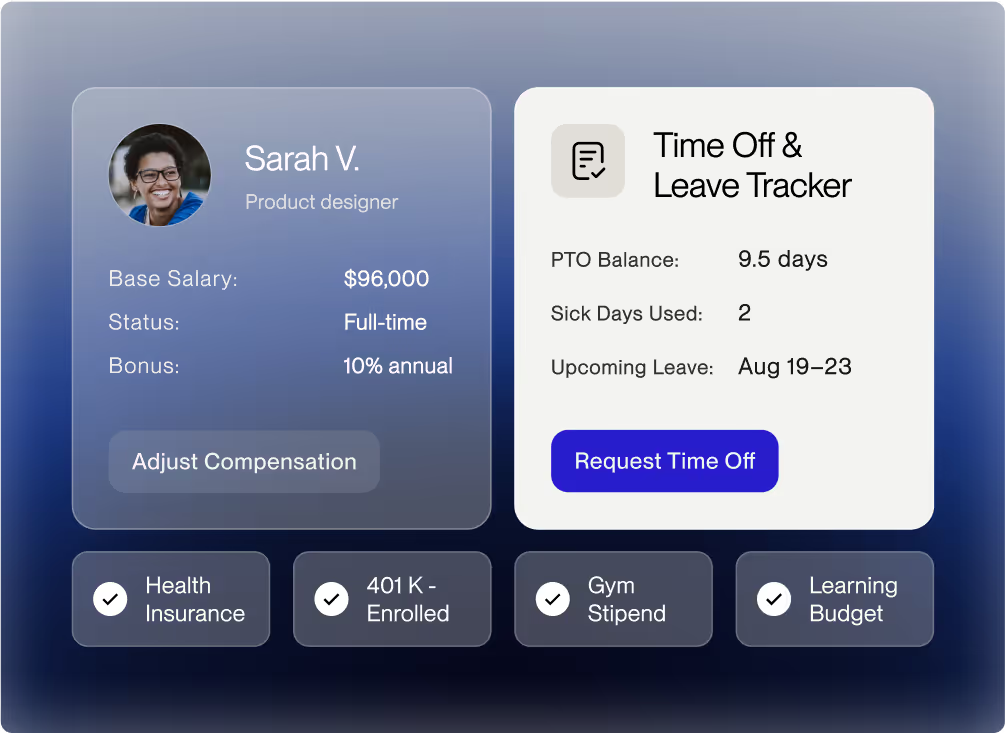Compensation, Benefits & Leave

When you find a great candidate, don’t just rush to offer a salary that makes them happy. Do your homework. And don’t forget to consider benefits and PTO in your offer as well.
Here’s everything you need to know about compensation, benefits & leave.
Get compensation right from the start.
Compensation is more than offering a competitive salary; it’s also about being compliant with the law and making sure you pay each employee fairly—or you’ll risk legal challenges.
The Federal Equal Pay Act prohibits the practice of offering different levels of compensation based on gender for jobs that involve equal skill, effort, and responsibility. It includes all types of compensation, including salary, overtime, bonuses, stock options, and benefits.
Fair pay practices involve avoiding wage discrimination based on factors such as gender, race, age, religion, national origin, or disability.
Unequal compensation is one of the fastest ways to dampen company morale, productivity, and employee retention. And what’s worse, it could lead to a lawsuit.
A typical startup mistake is paying employees at wildly varying salaries for similar levels and roles. Not only is this illegal, but it can also lead to future problems.
Let’s face it, no one wants to find out a peer at the same level is paid a lot more. And it’s a lot harder to cut an employee’s compensation later, so get it right from the start.
- Research competitive salary ranges for the role in the labor market based on industry benchmarks and the cost of living in the regions you plan to hire.
- Map compensation with your budget, including giving annual raises.
- Create pay ranges for each role and level within each function, such as Director versus manager.
- Ensure that you avoid any discrimination when it comes to pay and that similar titles have similar salary ranges to prevent gender or racial pay gaps.
- Check local regulations - some states and cities require pay transparency by law. For example, this might mean publishing salary ranges in your job descriptions and ensuring pay equity within your company.
- Offer stock options as a recruiting tool, but you’ll also need to work with your attorney on ensuring you comply with regulations regarding stock options and equity grants. Resource: Carta has some great stock option planning templates here.
Don’t overlook benefits required by law.
Specific benefits are required by state and federal law, such as unemployment insurance, disability insurance, workers’ compensation, and retirement benefits, including 401(k) plans.
- Most states require you to have workers’ compensation insurance in place to cover employee work-related disability or illness, even if you only have one employee.
- In some states, state unemployment and disability insurance are covered by payroll taxes, but in other states, they may be managed differently.
- For example, in California, state disability insurance is funded from payroll taxes, and the insurance is managed by the state.
- In contrast, New York State requires payroll deductions for state unemployment insurance and workers’ comp insurance, but leaves it up to employers to purchase insurance from state-approved carriers.
- Some states, like California, also have a mandatory retirement plan law that requires companies with five or more employees to offer retirement savings options, such as 401(k) plans.
- State regulations vary, so check your local state regulations.
Resource: Partner with Every to stay compliant with the benefits required by law
At Every, we proactively remind our startup customers when they hit the employee size threshold and are required to obtain certain benefits. For example, workers’ comp becomes mandatory when you hire your first non-owner W-2 full-time employee. Through our partners, we also support compliance with state-specific benefits and help our founders identify state-approved insurance carriers for workers’ comp insurance or 401(k) options. Find out more about how Every can help you.
Offer healthcare benefits to be competitive.
- The federal Affordable Care Act only requires businesses with 50 or more employees to provide health care insurance.
- However, to remain competitive and attract top talent, you may need to offer comprehensive benefits packages, including medical, dental, and vision coverage, from the outset.
Resource: Every’s HR platform, designed specifically for startups, can put together small-group health insurance benefit packages for you and your co-founder, as well as your employees.
Find out more about how Every can help you offer employee healthcare benefits.
To vacation or not?
- There are no federal laws mandating paid vacation time, so whether or not you offer paid vacation is entirely up to you as an employer.
- However, if other startups in your industry offer paid vacation or unlimited paid time-off, then you’ll want to do so as well to be competitive.
- To ensure employee well-being and productivity, you also may encourage your employees to take time off to rest and recharge.
There are federal and state regulations requiring unpaid leave for specific qualifying events, such as medical reasons or childbirth.
- The federal Family and Medical Leave Act (FMLA) kicks in at 50 employees, while in California, the California Family Rights Act (CFRA) kicks in at 15 employees. These laws require 12 weeks of unpaid leave for personal medical reasons, childbirth, adoption, or caring for a sick family member.
- Some states also require paid sick leave.
- Check state regulations on family and medical leave. If you hire employees in multiple states, you must ensure compliance with state regulations.
If you found this helpful, you’ll get even more from the full Founder’s HR Guide.
{{ebook-cta}}












